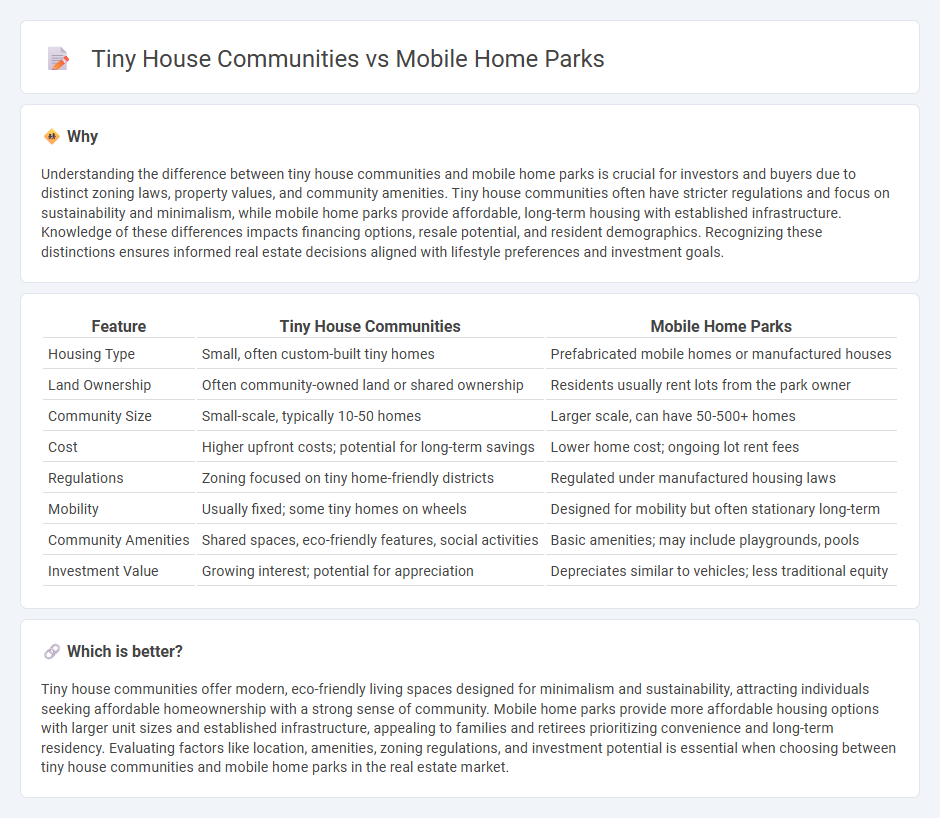
Tiny house communities offer compact, affordable living with a focus on sustainability and minimalist design, appealing to those seeking eco-friendly urban retreats. Mobile home parks provide larger, pre-fabricated homes with greater space and flexibility, catering to individuals and families desiring affordable, traditional housing without land ownership. Explore the distinct benefits and lifestyle options of tiny house communities versus mobile home parks to find the best fit for your housing needs.
Why it is important
Understanding the difference between tiny house communities and mobile home parks is crucial for investors and buyers due to distinct zoning laws, property values, and community amenities. Tiny house communities often have stricter regulations and focus on sustainability and minimalism, while mobile home parks provide affordable, long-term housing with established infrastructure. Knowledge of these differences impacts financing options, resale potential, and resident demographics. Recognizing these distinctions ensures informed real estate decisions aligned with lifestyle preferences and investment goals.
Comparison Table
| Feature | Tiny House Communities | Mobile Home Parks |
|---|---|---|
| Housing Type | Small, often custom-built tiny homes | Prefabricated mobile homes or manufactured houses |
| Land Ownership | Often community-owned land or shared ownership | Residents usually rent lots from the park owner |
| Community Size | Small-scale, typically 10-50 homes | Larger scale, can have 50-500+ homes |
| Cost | Higher upfront costs; potential for long-term savings | Lower home cost; ongoing lot rent fees |
| Regulations | Zoning focused on tiny home-friendly districts | Regulated under manufactured housing laws |
| Mobility | Usually fixed; some tiny homes on wheels | Designed for mobility but often stationary long-term |
| Community Amenities | Shared spaces, eco-friendly features, social activities | Basic amenities; may include playgrounds, pools |
| Investment Value | Growing interest; potential for appreciation | Depreciates similar to vehicles; less traditional equity |
Which is better?
Tiny house communities offer modern, eco-friendly living spaces designed for minimalism and sustainability, attracting individuals seeking affordable homeownership with a strong sense of community. Mobile home parks provide more affordable housing options with larger unit sizes and established infrastructure, appealing to families and retirees prioritizing convenience and long-term residency. Evaluating factors like location, amenities, zoning regulations, and investment potential is essential when choosing between tiny house communities and mobile home parks in the real estate market.
Connection
Tiny house communities and mobile home parks share a common focus on affordable, compact living solutions that maximize land use efficiency. Both types of communities often provide shared amenities and foster close-knit social environments, promoting sustainability and minimalistic lifestyles. This connection highlights a growing trend in real estate development towards alternative housing models that address urban density and housing affordability challenges.
Key Terms
Zoning Regulations
Zoning regulations for mobile home parks are often more established, permitting higher density and dedicated spaces for manufactured homes within residential or mixed-use zones. Tiny house communities frequently face stricter zoning challenges due to their non-traditional sizes and classifications, often requiring variances or special permits to build legally. Explore specific local zoning codes to understand how they impact the development and sustainability of these unique housing options.
Infrastructure
Mobile home parks typically offer established infrastructure including paved roads, utility hookups for water, electricity, and sewage, as well as community amenities such as playgrounds and laundry facilities. Tiny house communities often emphasize eco-friendly features like solar power, composting toilets, and shared communal spaces, though infrastructure can vary widely depending on location and regulations. Explore how infrastructure differences impact lifestyle and investment opportunities in both community types.
Community Amenities
Mobile home parks often feature extensive community amenities such as playgrounds, swimming pools, clubhouses, and organized social events, creating a vibrant neighborhood atmosphere. Tiny house communities prioritize shared green spaces, communal gardens, and sustainability-focused facilities, fostering close-knit, eco-conscious living environments. Explore the unique amenities each offers to find the perfect community lifestyle match.
Source and External Links
Mobile Home Parks in New York - This webpage provides listings of mobile home parks across New York, offering homes for sale or rent in various communities.
Mobile Home Parks - Explore mobile home parks nationwide, including all-age communities and 55+ parks with mobile homes for sale or rent.
Mobile Home Parks for Sale in New York - Lists mobile home park properties available for sale in New York, detailing their size and value.
 dowidth.com
dowidth.com